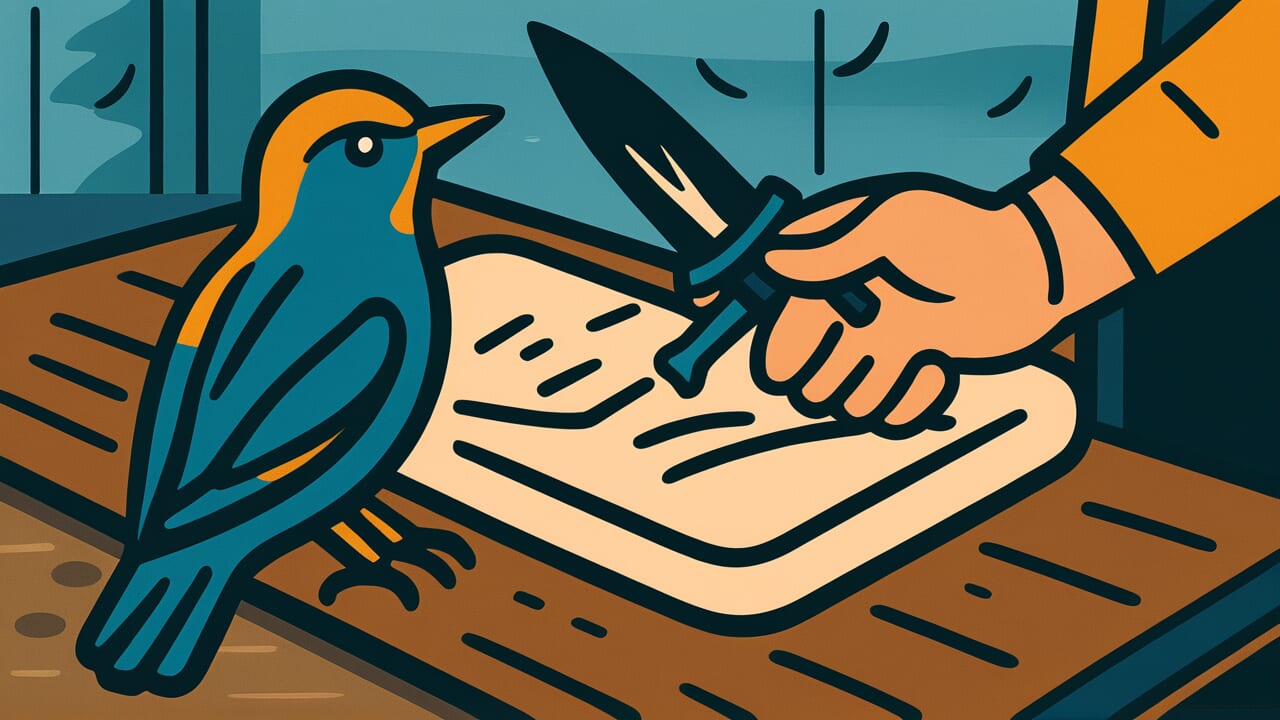How to Read “Stab a sleeping bird”
Nedori wo sasu
Meaning of “Stab a sleeping bird”
“Stab a sleeping bird” means attacking someone who has let their guard down and causing them harm. Just as a sleeping bird is defenseless, this proverb describes attacking someone when they are not being cautious.
This proverb is mainly used to criticize situations where someone uses cowardly methods to trap others. It also describes betraying trust and launching surprise attacks.
In the business world, it can refer to strategies where companies target competitors during vulnerable periods to steal market share. It also describes suddenly betraying someone you had built a trusting relationship with.
Even in modern society, this expression serves as a warning against despicable acts that exploit someone’s defenseless state.
Rather than fair competition, targeting someone at their weakest moment is seen as morally wrong, even if it succeeds.
Origin and Etymology
There are no clear written records about the origin of “Stab a sleeping bird.” However, we can make interesting observations from the phrase’s components.
“Nedori” (sleeping bird) literally means a bird that is asleep. When night comes, birds sleep on tree branches or in nests, completely defenseless.
During the day, birds fly freely through the sky and can escape quickly when they sense danger. But while sleeping, they become as vulnerable as any ground animal.
The verb “stab” suggests this expression came from hunting scenes. In ancient Japan, people used various methods to catch birds for food.
Targeting sleeping birds was probably one of the easiest and most reliable methods. However, this approach carried a sense of cowardice and guilt.
The background of this proverb likely includes Japanese culture that values bushido and fair combat. Attacking a sleeping opponent was considered morally wrong, even if efficient.
This expression came to be used with the meaning of warning against such despicable acts.
Usage Examples
- A subordinate I trusted stabbed a sleeping bird by stealing an important client while I was on a business trip
- He stabbed a sleeping bird by taking advantage of his friend during a difficult time to gain profit
Universal Wisdom
Behind the proverb “Stab a sleeping bird” lies the eternal dilemma between power and morality in human society.
Humans constantly waver between efficiency and justice. If you stab a sleeping bird, you will certainly catch your prey. This is an undeniable fact.
But why do we feel this is cowardly? It’s because humans are creatures who value not just results, but also the process of achieving them.
This proverb shows a universal human value: the method of victory matters as much as victory itself.
In every era and culture, trampling on the weak has been despised. This is because anyone can become weak at times.
Today’s strong person might be tomorrow’s weak person. This fear makes people demand fairness.
What’s interesting is that this proverb is not just moral preaching but also a practical warning.
Acts like stabbing a sleeping bird might bring temporary success. However, in the long term, they lead to loss of trust and isolation.
Human society is built on mutual dependence. Therefore, cowardly methods ultimately strangle yourself.
When AI Hears This
Game theory analyzes situations where players predict each other’s actions. What matters here is “whether the opponent can react.”
Stabbing a sleeping bird represents an extreme state where the opponent’s reaction probability is zero.
In normal competitive games, when you attack, your opponent can also choose defense or counterattack.
In rock-paper-scissors, for example, your opponent throws their hand simultaneously, so your win rate is one in three.
But when your opponent is sleeping, it becomes a “single-player game” where only you have the power to choose actions. Your win rate becomes 100 percent.
What’s interesting is that this advantage arises from “blocking the flow of information.” The opponent cannot receive information about being attacked, so their decision-making process never starts.
Modern cyberattacks targeting zero-day vulnerabilities have the same structure. Attacks succeed because the defender doesn’t know the weakness exists—they’re sleeping.
More importantly, this strategy has “timing irreversibility.” Once the opponent wakes up, you can never gain the same advantage again.
That’s why companies are extremely cautious about information leaks regarding new product launches and military operations.
Keeping the opponent in a sleeping state itself constitutes most of the victory.
Lessons for Today
The proverb “Stab a sleeping bird” teaches modern people two important lessons.
First is the vigilance needed to avoid becoming a “sleeping bird” yourself. Modern society overflows with information and changes rapidly.
If you let your guard down even a little, you’ll be left behind. However, this doesn’t mean you must always be tense.
What matters is maintaining healthy crisis awareness while building trustworthy relationships. Regularly reviewing your position and staying sensitive to changes around you is the best way to prevent surprise attacks.
Second is the self-control needed to avoid becoming the “stabber” yourself. In competitive society, there’s always temptation to exploit others’ weaknesses.
However, if you betray trust for short-term gain, you’ll lose your reputation and relationships in the long term.
True strength lies in the character to behave fairly even when your opponent is defenseless. Success won through fair methods leads to sustainable happiness.



Comments